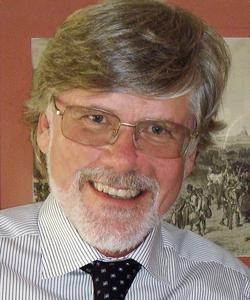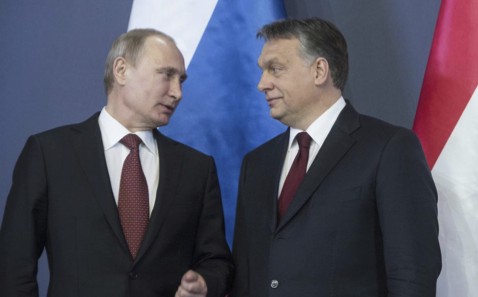
With Russia’s economy heading for recession and isolation from markets in the West, Russia’s President Vladimir Putin is cultivating alternative friendships in and around Europe. Although the rewards may be meagre, what is likely to be achieved is mischief. The European powers’ efforts to maintain a common EU policy on Russia is already shaky with several governments questioning the wisdom of sanctions. The Kremlin is playing into whatever cracks it can find.
THE SERIOUS deterioration in relations between Russia and the European Union has forced Moscow to embark on a search for economic allies. Russian President Vladimir Putin has responded to the rift by siding with governments which may help break or at least erode the European resolve to inflict punishment via sanctions. Added to which, Mr Putin has launched an effective propaganda offensive to exploit differences of opinion between EU member states. There is growing realisation within the EU that this propaganda offensive must be countered. During a recent conference in Brussels, Bulgaria’s president, Rosen Plevneliev, whose country depends on Russia for more than 90 per cent of its gas supplies, said Mr Putin’s propaganda machine was attempting to split EU member states.
Authoritarian stance
The concern is that some EU governments will start breaking ranks, causing the common policy on Russia to crumble. A prime candidate is Hungarian Prime Minister Viktor Orban, whose increasingly authoritarian stance has already caused friction with Brussels. In mid-February 2015 he received Mr Putin on an official visit, and gave his guest a warm welcome. Mr Putin has referred to Hungary as one of Russia’s most important partners, and Russian Foreign Minister Sergei Lavrov has noted that, in contrast to other EU countries, Hungary does not succumb to ‘Russophobic approaches’. During the meeting in Budapest, Mr Orban voiced his conviction that ‘locking Russia out of Europe is not rational’. He said, whoever thinks that Europe can do without cooperation with Russia is ‘chasing ghosts’.
Another problem is Czech President Milos Zeman, who is on record as saying sanctions against Russia are ‘ineffective’ and ‘stupid’. In September 2014, he appeared as the only EU leader at a meeting on the Greek island Rhodes. The meeting was organised by Vladimir Yakunin, the head of Russian Railways. President Zeman did not seem concerned by the fact that his host is a close friend of Mr Putin and an oligarch put on the US blacklist after the Russian annexation of Crimea.
Although the Czech government has a less accommodating attitude than that of its president, Mr Zeman has been very helpful to the Kremlin’s propaganda.
Closest ally
A third feature in the Kremlin’s search for a new set of friends is Serbia. In October 2014, Mr Putin was guest of honour at a military parade in Belgrade. At the ceremony, Serbian President Tomislav Nikolic awarded his guest the Order of The Republic of Serbia, and said Russia was his country’s ‘big ally’.
Mr Putin in return expressed his support for the Serbian government in its opposition to the Western policy of recognising Kosovo as an independent state, and noted that ‘Russia, just as in the past, will always see Serbia as our closest ally’.
The real key in the Kremlin’s search for new friends is Turkey. Following lengthy prevarication by Brussels on the issue of membership for Turkey in the European Union, Ankara has come to the conclusion it is not wanted. And it has acted accordingly. The new course charted by President Recep Tayyip Erdogan has caused increasing tensions with the EU. Brussels has condemned crackdowns on domestic political opposition in Turkey, and Mr Erdogan has condemned rising European Islamophobia. Russia and Turkey presently share the position of being major neighbours to the EU with whom Brussels is finding it increasingly hard to deal. Their respective leaders also have much in common. Like Mr Putin, Mr Erdogan was initially seen as a reformer who would lead his country towards Europe. Both have since decided that restoring national pride is central.
Conspiracy theories
Both claim to have been deceived by the West, and both are marked by an obsession with conspiracy theories, viewing all domestic political opposition as plots by the West. But it is questionable how much Russia stands to gain.
While Brussels may have legitimate grounds to be concerned about what the Kremlin may achieve in its ambition to divide and conquer, Mr Putin would be well advised to consider the economic price that Russia will be forced to pay.
The Russian economy is fundamentally geared into interaction with the big European economies. Reliance on sales of oil and gas to China will conserve its dependence on resources, and thus impede much needed modernisation. During Mr Putin’s first two terms in office, his friends in Europe were high and mighty, including the-then German Chancellor Gerhard Schroder and Italian Prime Minister Silvio Berlusconi. They stood ready to support major projects of industrial as well as energy cooperation. In its ambition to lock a stranglehold on European gas markets, the Kremlin could bargain from a position of strength, constructing pipelines and picking up shares in distribution networks. Mr Putin symptomatically never even spoke about the EU but merely of ‘friends in Europe’. Today, his circle of close friends has narrowed to Hungary and Serbia, and increasingly also Greece.

Economic benefit
These new friends offer little economic benefit, to offset losses from reduced trade with the main European economies. Oil and gas makes up 85-90 per cent of Russian exports to Hungary, Slovakia and the Czech Republic.
And the share of Russia in the exports of those countries is a meagre three to five per cent. Similarly, trade relations with Serbia are dominated by energy for agricultural products, offering little traction for modernisation. The relationship between Moscow and Ankara is also geared into energy cooperation, with Turkey emerging as a regional energy hub. There is much else that divides. The two disagree over Syria. Turkey has relied on Nato Patriot missiles as a hedge against a broadening of the conflict, and the energy deals have probably been more beneficial to Turkey than to Russia. The Kremlin is trying to build support for a new project to pump gas via Turkey into Southeast Europe, to be known as Turkish Stream. Both Greece and Hungary have endorsed those plans, and on April 7, 2015, Serbia, Macedonia, and Turkey came on board. Mr Putin has stated that once the pipeline is operational, Gazprom will halt supplies of gas to the EU via Ukraine. If Brussels wants further Russian gas, it must help pay for the new infrastructure in Southeast Europe.
Reducing dependence
It may sound threatening, but the time for such posturing is clearly over. The EU has shown great determination in reducing its dependence on Russian gas. In a comment on the prospects for Turkish Stream, a Turkish commentator also noted, rather drily, that ‘Frankly, nobody in Turkey is taking it very seriously.’
Taking on EU regulators is not a promising path. The core feature at the meeting in Budapest was a deal for the Russian state nuclear power corporation, Rosatom, to upgrade Hungary’s only nuclear power plant – sited in the centre of the country at Paks. The Kremlin even offered a 10 billion euro loan, again on favourable terms, to cover 80 per cent of the cost for the nuclear deal.
The response from Brussels was refusal by Euratom to approve the plans to import nuclear fuel exclusively from Russia. Budapest has appealed against the decision but, according to three people close to the talks, the European Commission has thrown its weight behind Euratom’s rejection of the contract.
Warming relations
Even Serbia, which is enthusiastic over its warming relations with Russia, will be wary of pushing too far. Despite its anger over independence for Kosovo, in May 2013, Belgrade opened a process of normalising relations with Pristina. In January 2014, Serbia officially opened negotiations on joining the EU, and it has declared neutrality on sanctions against Ukraine. Greece, finally, presents another dream deflated. When Greek Prime Minister Alexis Tsipras met with Mr Putin on April 8, 2015, in Moscow, there was concern the Kremlin might offer major credits to reduce the hold of Brussels over Athens, and that in return it would get a major foothold inside the EU.
Wisdom of sanctions
But all that came out of the meeting was rumours about a possible Russian three to five billion euro advance credit for signing onto Turkish Stream, and about a vague Russian desire to participate in Greek privatisation plans.
With the Russian economy heading for recession and likely long-term isolation from markets in the West, the new friendships Mr Putin is cultivating will offer meagre rewards. What he may achieve is mainly mischief.
The ambition by major European powers, such as Germany and France, to maintain a common EU policy on Russia is already shaky, with several governments openly questioning the wisdom of sanctions. The Kremlin is busy playing into whatever cracks it can find, and it will make headway. The sanctions policy is presently in limbo. Unless something truly egregious happens, there will be no further sanctions.
But nor will Russia be rewarded by a scaling back of existing sanctions. The implication is that ambitions to find a solution for Ukraine will also remain in limbo, to its great detriment. If Greece does move closer to Moscow, and if Greek Cyprus moves ahead allowing basing rights for Russian naval and air force assets, then even Nato may feel the pinch of eroding internal cohesion.
But even this seems to be much hot air. The deal signed on February 26, 2015, allows the Russian navy to make port calls in Cyprus, which is a far cry from actually leasing military bases, something that the UK has been vociferously against. Mr Putin may well derive temporary satisfaction from achievements in exacerbating tensions within the EU, and possibly even within Nato. Both organisations may be held up as increasingly ineffective.
This report has been written by Professor Stefan Hedlund and made available to our members through the courtesy of © Geopolitical Information Service AG, Vaduz:
www.geopolitical-info.com
Related Reports:
- Russia ‘unprepared’ for modern war pushes forward nuclear option
- Time is running out for the West to engage with Russia
- Threats emerge of new Balkans Cold War split between the West and Russia
www.geopolitical-info.com


